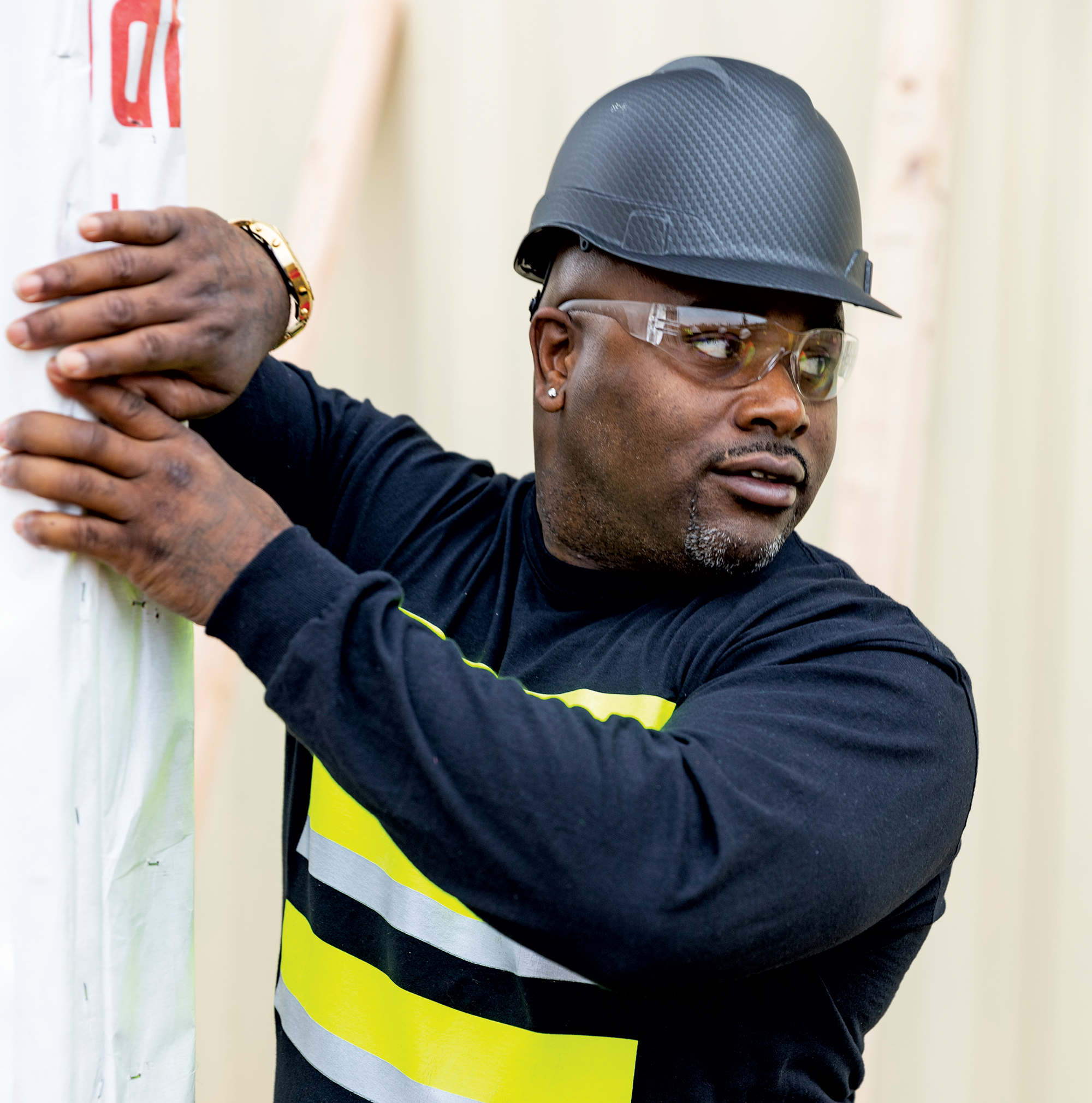
Legal relief Legal relief Legal relief
Longtime prisoners sentenced as minors benefit from a UW program that pairs students and lawyers.
By Luna Reyna | Photos by Dennis Wise | December 2021
A predictable spectrum of gray clouds covers a clearing behind the Pure Heart Ministries Church. A handful of teenage boys and men in work boots, neon construction vests and hard hats carefully lift the last wall of a tiny home into place. The Federal Way church donates a portion of its property to the Urban League of Metropolitan Seattle for its construction trades program. While building tiny homes, participants learn blueprint reading, how to use hand and power tools, and other skills that may help them overcome barriers to employment and success. “Once we’re complete with [a tiny home], the Low Income Housing Institute will come to get it, take it to a tiny home village, and a family will reside in one of these,” says Amesha Lawton, Urban League program manager.
Among those working on the home is Jamar Beaver, a reserved 38-year-old with a strong handshake, gentle smile and newfound freedom thanks to recent legislation and the Juvenile Parole Project in the UW Department of Law, Societies and Justice. In 2012, the Supreme Court decided in the landmark case Miller v. Alabama that long and life sentences, when imposed mandatorily, were unconstitutional for the vast majority of juvenile defendants. Recent cognitive neuroscience findings have proved that from the ages of 18 to 25, a person’s brain continues to develop in the prefrontal cortex, the area responsible for planning, prioritizing and controlling impulses. With this new understanding, policymakers have reconsidered the ways in which adolescent health and well-being are affected in the criminal legal system.
By 2014, Washington state passed legislation that requires the parole board to grant parole to people who are sentenced as juveniles and have served 20 years in prison—unless the board believes the person would commit another crime. “We did an analysis of the parole board’s decision-making from 2014 through 2019, trying to understand what factors may be shaping the parole board’s decisions,” says Professor Steve Herbert, who created the Juvenile Parole Program. “One of the things that we learned was that having a lawyer increased your chances of getting a release.”
This research inspired Herbert to develop a class that prepares students to assist pro bono attorneys in representing juvenile parole board petitioners. “My role is to recruit the attorneys and then prepare the students,” he says. Herbert then reaches out to imprisoned individuals who are eligible for the parole hearings and asks if they would like the extra assistance, at no cost to them. “Once I’ve assigned a lawyer and a team of students to an individual, then I step out and let them work with the petitioner,” he says. Herbert estimates that there may be 200 people in Washington in Washington prisons who are eligible. Beaver’s case is the program’s first success. Beaver was hesitant to accept Herbert’s offer of help, but eventually agreed. “He was more hands-on than I thought he was going to be, so I’m very appreciative of that,” he says.
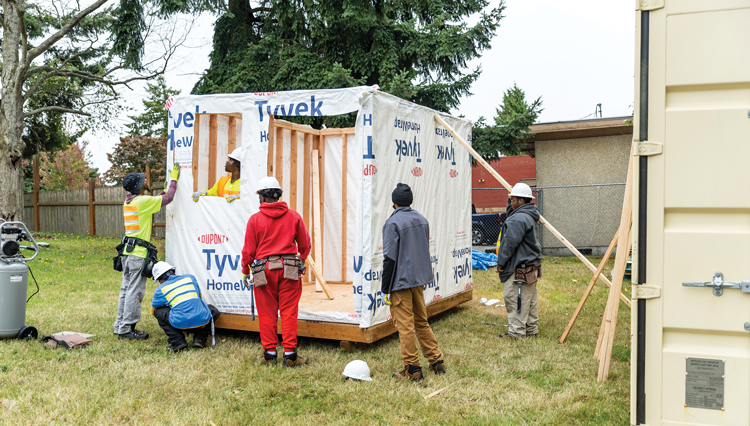
Not long after his release from prison, Jamar Beaver joined a construction trades program at the Urban League of Metropolitan Seattle. He is learning the basics of construction while building tiny houses for families in need.
Beaver had been convicted of attempted robbery, assault, possession of a firearm and assault with a deadly weapon, a crime that occurred when he was 17. This was not his first charge. As a 12-year-old, Beaver was arrested for riding in a stolen vehicle. He takes full responsibility for his crimes. He also believes that incarcerating him at such a young age set him on the wrong path. “For me it created a whole different type of person,” he says. “There are different things that they could have done, to be more hands-on, to develop the brain, as opposed to just putting you in there and letting your peers, in a sense, develop it for you. I was really looking for acceptance at the end of the day.”
Washington’s own Health Impact Review, which came out in January, parallels Beaver’s criticism of the justice system and his experience. The review focused on the impact of the criminal legal system on children 8 through 12 and those 18 and 19. Its findings revealed that incarcerating youth had extremely adverse long-term health effects. It also found that the younger a person is the first time they are incarcerated, the more likely they are to be repeat offenders, creating a cycle of crime and incarceration into adulthood.
Learning these facts in the classroom motivated Ana Kelly to take on issues they felt needed remedy. Kelly graduated in June with a Law, Societies & Justice degree and was one of the students chosen to work with the pro bono attorney, Brittany Ward, ’12, on Beaver’s petition for release. “One of my favorite things about the program is that they really present the criminal justice system and the criminal legal system and all their faults, but they also go one step further and really teach us about what can be done to remedy those faults and deficiencies,” Kelly says. “I really wanted to get involved in trying to fix [the criminal legal system] and address the problems.” So when Herbert sent an email to Law, Societies & Justice majors detailing the juvenile parole project pilot program, Kelly jumped at the opportunity. “It’s a system that sets people up to fail and recidivate. That really angered me. I knew that I wanted to try to help there in any way I could.”
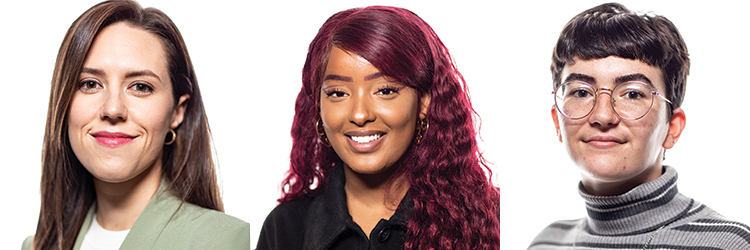
From left, attorney Brittany Ward, ’12, worked on Jamar Beaver’s case with students Neima Ahmed, ’21, and Anna Kelly, ’21.
Neima Ahmed, the second student chosen for Beaver’s team, was motivated by her own experience. “I wanted to do this type of work because my family was impacted by the criminal justice system when I was growing up,” she says. “I had some siblings that I wish I could have helped. I know how the system can break apart families, and it has always been a deep interest of mine to do good work and try to bring families back together while they still can.” Ahmed also graduated in June with an LSJ degree.
“It was really compelling, the opportunity to work with a set of students who may not be interested in going to law school but were certainly interested in the topics and social work in general,” says Ward, a litigation attorney with the firm Floyd, Pflueger & Ringer. When Herbert proposed the project to Ward, she saw a great opportunity. “It was important for Jamar’s petition to have an advocate, and a big part of that is just the amount of legalese and preparation and volume of paperwork that goes into putting a petition together,” she says. “I spent more hours than I can count, certainly over 100, preparing for Jamar’s hearing, and preparing a packet of paperwork that we believe was necessary to brief the board on why his release was possible.”
A large part of this process typically includes meeting with the petitioner and working with them on the release plan that would be submitted to the parole board. Unfortunately, during the early stages of the pandemic, all visitation, including from an attorney, was suspended. “The pandemic made it a lot harder,” Ward says. “I think it’s important to have face-to-face conversations with the client and get to know them.” The process of information gathering requires some degree of trust between the petitioner and the attorney. Cultivating that solely through the Department of Correction’s email system from September 2020 up until Beaver’s release this summer was challenging.
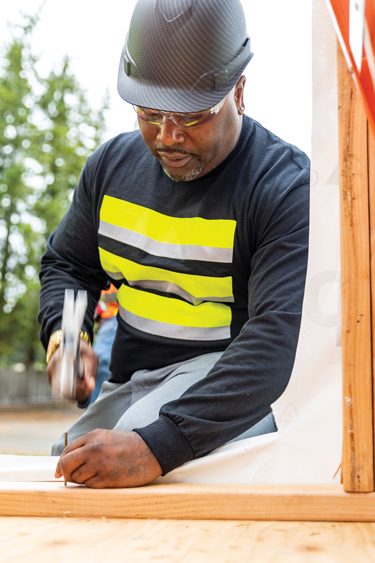
Beaver struggled to adjust to life as a free man, but he found purpose working in construction in the Urban League’s training program.
“Jamar was incredibly patient and kind and fun to work with,” Ward says. “I really learned a lot from speaking to him. The tenacity of the human spirit, where he is clearly very unhappy to be incarcerated, but he always had a positive attitude during our calls.” For Ward, Beaver’s positivity, especially when the pandemic and the election had people being cruel to one another, was refreshing. “Even given a tough situation, such as applying for a petition during a pandemic, or having to be incarcerated during a pandemic, he really has a strong character,” Ward says.
Presenting a petition that showed a support system and stability for Beaver was critical to the parole board’s decision, so Ward, Kelly and Ahmed worked with Beaver’s family to plan a smooth transition. “We’ve been waiting, and we’ve been fighting in the court, so just to have somebody coming in and conducting interviews and really wanting to get their input on certain things, it was exciting for them,” Beaver says of his family.
“It was a really good experience working alongside everybody,” Kelly says. “They were very helpful in crafting the petition that ultimately led to Jamar being released.”
As much as Beaver appreciated all the work put into his petition and the eventual approval of his release, he still found it hard to believe. For many incarcerated folks, becoming numb to or accepting that their future will always be within the walls of a prison is what helps them mentally process the monotony of day-to-day life. “Until that actual day, it’s not real,” Beaver says. But when he finally was able to put on his own clothes and walk out of the prison, his view changed. “It was surreal,” Beaver says.
Over the past 21 years and four months, if Beaver was in a vehicle, it was in handcuffs with shackles around his ankles. Sitting in the passenger seat of his ex-wife’s SUV without the weight of those restraints was liberating—and also very foreign. After being picked up, his anxiety kicked in and Beaver became physically sick. They stopped at a gas station with a McDonald’s so he could throw up in the restroom. Then he purchased his first meal out of prison. Not particularly for the food, but because he wanted to order for himself for the first time in more than two decades. Later, his family gathered at his mother’s house. In a day filled with firsts, Beaver was able to hug his loved ones. “We celebrated as a family,” Beaver says.
Newfound family is how Beaver got involved with Urban League. Louis Davis is the lead construction trade coordinator at Urban League and Beaver’s cousin through marriage. They didn’t know this until they ended up in prison together in 2003. Beaver and Davis became very close, even becoming cellmates until they were transferred to different prisons. “It was more like a brotherhood than anything,” Davis says. In prison, Beaver would look out for Davis, especially when it came to meals. “I didn’t have much food when I first got locked up because my family wasn’t there for me,” Davis says. So, Beaver used the money sent to him to help his cousin with food.
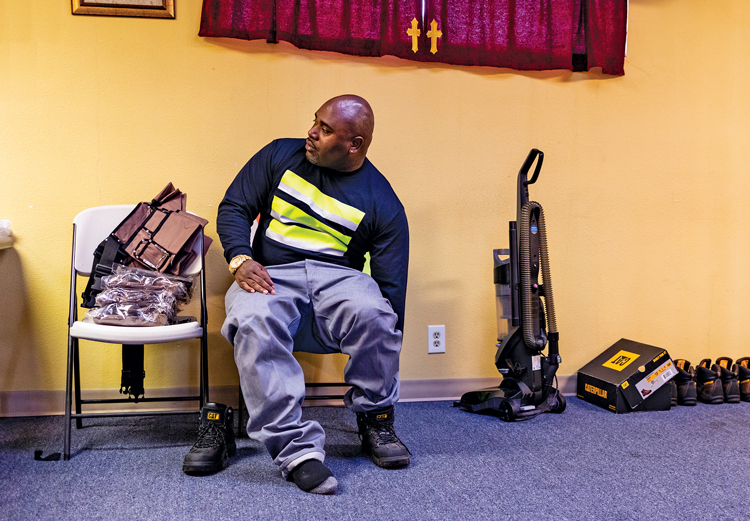
Beaver’s positive attitude helped keep his legal team going, attorney Brittany Ward says.
Now that Beaver has been released, that relationship of support lives on. “I know for me, it was important to continue to have a program when I got out, and to have support,” Davis says. “I go out there every day after work. Today I’m going to go and pick him up and then we’re going to go to my house and have a little crab boil and just hang out.” Davis has also introduced Beaver to what he calls Urban League’s “barrier breakers,” which include resume-building and job-search assistance. Beaver is eager to get to work and dreams of owning a janitorial business with his cousins.
The UW juvenile parole project helped change the course of Beaver’s life and affirmed the courses of both students’ lives. “When we just found out that Jamar was being released, it was really just like an ‘aha’ moment,” Ahmed says. “I felt like I was able to help change someone’s life.” Now, she plans to continue to work with underrepresented communities. “I want to continue doing clemency work and I want to work with innocence projects, maybe have my own one day,” Ahmed says. “I definitely know that I want to stick to doing some nonprofit work and going into communities that really need representation.”
Kelly is already pursuing such work as an applicant and student services counselor for the Post-Prison Education Program, a Seattle nonprofit designed to reduce recidivism. Her background in the juvenile parole project has helped her in her new role. “I’m actually working with someone right now who’s going to be going through the same process that Jamar went through,” Kelly says. “He doesn’t have anyone to represent him. I am able to use that experience on a different person. That feels really great.”
Ward learned about the importance of protecting attorney-client privilege and about having conversations of more sensitive topics over the phone. “And I learned that people really had no idea that in Washington state it was legal to impose indeterminate or incredibly long sentences on juveniles,” Ward says. “A lot of people in my life didn’t think that was really happening in our progressive, liberal state of Washington, and the reality is there’s a lot of now-adults who are serving 20 or more years of sentences, and that’s really sad.
Parole petitions like Beaver’s show the injustice of keeping people in prison for crimes they committed before their brains had fully developed, says Ward. “My biggest takeaway is we have some wrongs to correct in this state, and we shouldn’t be incarcerating people for that long for crimes they committed as young people.”